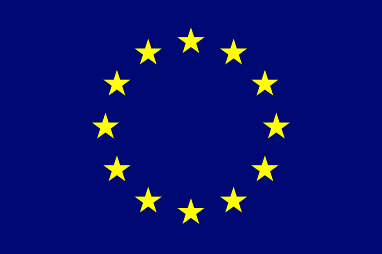Publications
Throughout the year, VOICE produces and disseminates key documents reflecting on humanitarian aid issues at the EU level and from an NGO perspective. They are addressed to decision-makers within the European institutions, at the National level, to NGO networks and other stakeholders of the humanitarian community, as well as to the VOICE members. Some documents are produced by the VOICE Secretariat with the support of VOICE members while others are publications from members and other key stakeholders in the humanitarian sector.
Please note that members-only documents will not be visible unless you are logged in.
-
EU Member States’ policies and practice: Disaster Risk Reduction in humanitarian assistance and development cooperation
21 June 2017VOICE studies and briefing papersThis study highlights DRR policies and programming of a selection of EU Member States and presents recommendations for the further elaboration of their policy work on Disaster Risk Reduction. -
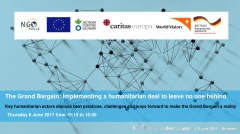
EDD 2017- Grand Bargain event power point - 8 June 2017
20 June 2017The Grand Bargain Task Force organised an event at the European Development Days 2017 on 8 June 2017. Here is the full power point of the session. -
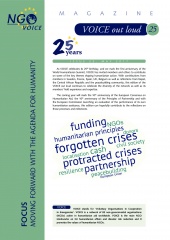
VOICE out loud n.25 Moving forward with the agenda for humanity
14 June 2017VOICE out loudThis new edition of VOICE out loud celebrates our 25th birthday focusing on moving forward and implementing the Agenda for Humanity. With reflections from the field in Nepal and in Central African Republic and contribution from our members in Sweden, Spain, UK, Belgium, this edition continues to celebrate the diversity of our network and its members's field experience and expertise. -

-
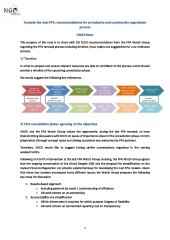
-
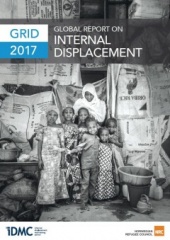
2017 Global Report on Internal Displacement
24 May 2017Members' publicationsThe 2017 Global Report on Internal Displacement (GRID 2017) presents the latest data and trends of internal displacement by conflict and disasters worldwide. In 2016, one person per second was forced to flee.
This year’s report also looks at the connections between internal and cross-border displacement, the factors that force internally displaced people (IDPs) across borders, and the issue of refugees being returned home, only to become internally displaced again. The report highlights, that despite the fact that IDPs outnumber refugees by two to one, internal displacement is still neglected as an issue of global concern. -
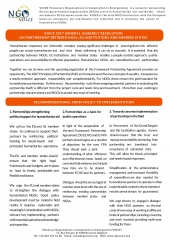
VOICE 2017 policy resolution on partnership between NGOs, EU institutions and member states
19 May 2017VOICE policy resolutionsAt the 2017 VOICE General Assembly the network focused on the importance in humanitarian assistance of a people-centred approach, quality operations and accountability to affected populations.
In order to achieve this goal, the partnership between NGOs, EU institutions and Member States is essential and we strongly support it.
-
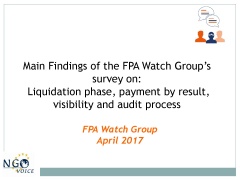
Summary main findings FPA WG Survey April 2017
09 May 2017FPA Watch GroupThe FPA Watch group launched a new liquidation survey as a follow up of the one made in 2015. The survey covers four FPA related issues: final reporting, liquidation process, visibility and audit. -
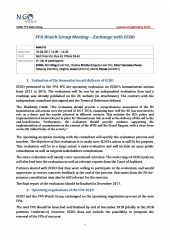
-
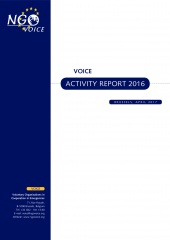
-
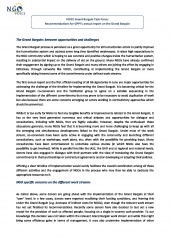
VOICE Grand Bargain Task Force recommendations to GPPI - April 2017
28 April 2017VOICE position papersThis paper highlights the opportunities and challenges NGOs perceive from the Grand Bargain implementation -
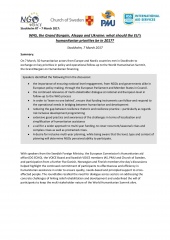
WHS, the Grand Bargain, Aleppo and Ukraine: what should the EU’s humanitarian priorities be in 2017? Stockholm Roundtable
15 April 2017VOICE event reports -

Joint NGO briefing on the Brussels Syria Conference
22 March 2017Members' publicationsSeveral NGOs and fora, including 29 VOICE members, call on all members of the international community, in particular permanent members of the UN Security Council and the EU and EU member states who are discussing post-agreement planning, to insist on the full implementation of relevant UN Security Council resolutions on Syria that relate to respect for IHL and IHRL, as well as implementation of the Geneva Communiqué of 2012.
The Brussels conference should also set the foundation for inclusive and meaningful participation of Syrian NGOs and civil society, including youth and women’s groups, as key partners in ensuring effective post-agreement planning that captures the needs and desires of the people of Syria and supports local community rebuilding and resilience. -

Training Manual: Gender leadership in humanitarian action
16 March 2017Members' publicationsGender interacts with multiple factors including but not limited to age, ethnicity, disability, caste, class, religion and environment, to determine an individual’s ability to be aware of, lay claim to, and access their rights and entitlements. In times of crisis – whether slow or sudden onset, climate or conflict driven – there are shifts in how these factors interact that present opportunities and risks for women, girls, men and boys in accessing their rights, in the short, medium and longer term. Humanitarian (and development) actors need to be sensitive to these risks and opportunities.
The purpose of this training manual is to support the institutionalization of gender equality and women’s rights in all humanitarian action. It was developed by Oxfam to support the implementation of the project Institutionalizing Gender in Emergencies: Bridging Policy and Practice in the Humanitarian System, supported by the European Commission’s Humanitarian Aid and Civil Protection department (ECHO) during 2015 to 2017. The aim of this initial training is to develop a critical mass of committed gender leaders – some might call these ‘change agents’ or ‘change-makers’ – who can together influence changes in policy and practice at different levels across the humanitarian system. -
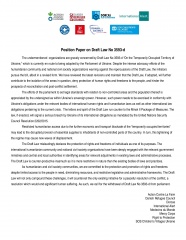
Joint NGO position paper on draft law no. 3593-d in Ukraine
10 March 2017Members' publicationsThe objective of this draft law “On the Temporarily Occupied Territory of Ukraine” is to state that what happens in occupied territory is not the concern of Ukraine government but the responsibility of Russia. If adopted, this will lead to a de-facto partition of the country.
In this joint position paper several NGOs, including VOICE members, state their commitment to the protection and promotion of rights and freedoms despite limited access to the people in need, diminishing resources, and restrictive legislative and administrative frameworks. They argue the Draft Law will not only compound these challenges, it will countervail the only existing initiative for a peaceful resolution of the conflict, a resolution which would end significant human suffering. As such, they call for the withdrawal of draft law No 3593-d from parliament. -

Joint NGO letter to EU heads of states calling for EU response to migration led by values, not fear
08 March 2017Members' publications162 NGOs and networks from 20 countries, among them39 VOICE members, call for EU leaders to live up to their commitments to European values in responding to migration and stop copying xenophobic populist recipes. EU leaders must show strong leadership that both defends human rights and addresses people’s fears, rather than fuelling them. The letter also calls for EU leaders to go beyond rhetoric and deliver on their commitments to defend the human rights of men, women and children on the move. -
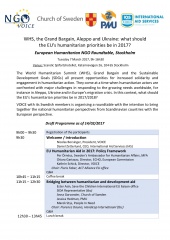
Stockholm roundtable programme: WHS, the Grand Bargain, Aleppo and Ukraine: what should the EU’s humanitarian priorities be in 2017?
07 March 2017The World Humanitarian Summit (WHS), Grand Bargain and the Sustainable Development Goals (SDGs) all present opportunities for increased solidarity and engagement in humanitarian action. They come at a time when humanitarian actors are confronted with major challenges in responding to the growing needs worldwide, for instance in Aleppo, Ukraine and in Europe’s migration crisis. In this context, what should the EU’s humanitarian priorities be in 2017/2018?
VOICE with its Swedish members organised a roundtable with the intention to bring together the national humanitarian perspectives from Scandinavian countries with the European perspective. -
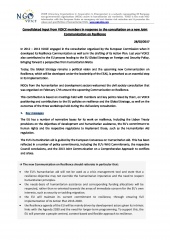
VOICE response to civil society consultation on new Resilience Communication
02 March 2017VOICE position papersIn 2012 – 2013 VOICE engaged in the consultation organised by the European Commission when it developed its Resilience Communication as well as in the drafting of its Action Plan. Last year VOICE also contributed to the EU process leading to the EU Global Strategy on Foreign and Security Policy, bringing forward a perspective from humanitarian NGOs.
Today, the Global Strategy remains a political vision and the upcoming new Communication on Resilience, which will be developed under the leadership of the EEAS, is perceived as an essential step in its implementation.
NGOs from the humanitarian and development sectors welcomed the civil society consultation that was organised on February 17th around the upcoming Communication on Resilience.
This contribution is based on meetings held with members and key points raised by them, on VOICE positioning and contributions to the EU policies on resilience and the Global Strategy, as well on the outcomes of the three workshops held during the civil society consultation. -

Considerations for Planning Mass Evacuations of Civilians in Conflict Settings
13 February 2017Members' publicationsEvacuations are one of the most delicate operations in a crisis environment. This guidance offers suggestions and considerations to help humanitarians, including NRC staff, to make decisions, ensure adequate planning and minimise risks to the affected population. -
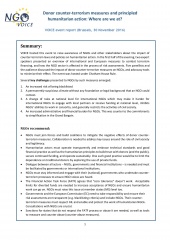
Donor counter-terrorism measures and principled humanitarian action: Where are we at?
09 February 2017VOICE event reportsVOICE organised this event on 30 November 2016 to raise awareness of NGOs and other stakeholders about the impact of counter-terrorism laws and policies on humanitarian action. It was attended by 104 participants from civil society and European Institutions. -

Joint NGO letter: call for immediate cessation of armed conflict and protection of civilians in Kachin and Northern Shan States, Myanmar
25 January 2017Members' publicationsA number of NGOs, including several VOICE members, wrote a joint letter, calling for protection of civilians in Myanmar's Kachin and Northern Shan States and asking the government and international community to take action. -

Suffering in Silence: The 10 most under-reported humanitarian crises of 2016
17 January 2017Members' publicationsCARE International launches a new report on the 10 most under-reported humanitarian crises of 2016. The report, "Suffering in Silence", features food crises in Eritrea, Madagascar, North Korea and Papua New Guinea; conflicts in Burundi, Lake Chad Basin, Democratic Republic of Congo, Central African Republic, Sudan and last year's monsoon floods in Bangladesh. -

"Putting People First" - Community engagement in humanitarian practice
06 January 2017Members' publicationsAddressing the central recommendation from the World Humanitarian Summit 2016 of ‘putting people first’, the Johanniter organised and evaluated two community engagement trainings, in Germany and DR Congo. They found that the „People First Impact Method“ (P-FIM) is a cost effective and efficient way to ensure that humanitarian response is timely, relevant and appropriate, where communities play their rightful role and the dignity of people affected by crisis is respected. -
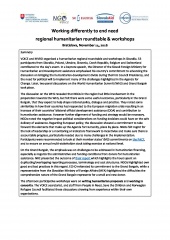
Bratislava regional roundtable - final report
21 December 2016VOICE event reportsOn 14 November 2016, VOICE and the Slovak NGO platform MVRO hosted a regional roundtable and workshops on "Working differently to end need". -
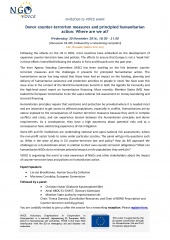
Bratislava roundtable "Working differently to end need" agenda
13 December 2016VOICE, together with Slovak NGO platform MVRO, hosted a regional roundtable in Bratislava that saw over 50 participants discuss national humanitarian priorities and expectations following the World Humanitarian Summit and Grand Bargain.

